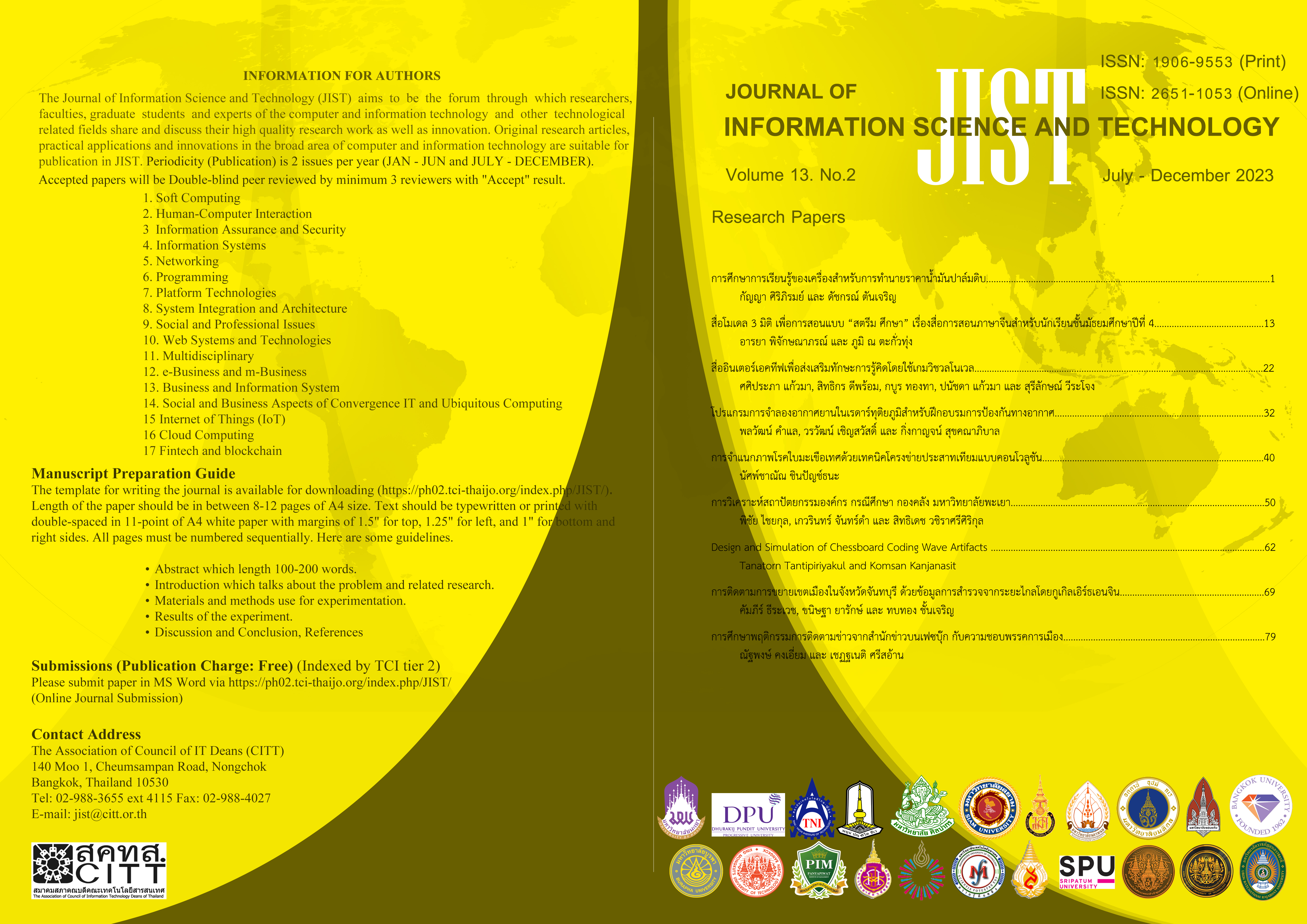Interactive Media for Cognitive Skill Improvement using a Visual Novel Game
Main Article Content
Abstract
The objective of the research is to create the "EDIHI" visual novel game in order to improve cognitive skills. In order to develop creativity and specific problem-solving skills in digital multimedia arts technology for first-year students, the 30 participants were split into two groups: the users of the electronic book medium EDIHI and the users of the game. The qualitative evaluation of visual novel games by experts is divided into five aspects, namely: 1) Game performance; 2) Game effectiveness; 3) Game flexibility; 4) Game presentation; and 5) Game content. The research found that qualitative evaluation of visual novel games by experts has a mean of 4.48 and a standard deviation of 0.51, quality is highest level. According to research studies, users of the visual novel game EDIHI reported higher perceived levels of developing creativity and problem-solving abilities on the fly than users of the electronic book media titled EDIHI at the statistical significance level of 0.05 in all aspects.
Article Details
This work is licensed under a Creative Commons Attribution-NonCommercial-NoDerivatives 4.0 International License.
I/we certify that I/we have participated sufficiently in the intellectual content, conception and design of this work or the analysis and interpretation of the data (when applicable), as well as the writing of the manuscript, to take public responsibility for it and have agreed to have my/our name listed as a contributor. I/we believe the manuscript represents valid work. Neither this manuscript nor one with substantially similar content under my/our authorship has been published or is being considered for publication elsewhere, except as described in the covering letter. I/we certify that all the data collected during the study is presented in this manuscript and no data from the study has been or will be published separately. I/we attest that, if requested by the editors, I/we will provide the data/information or will cooperate fully in obtaining and providing the data/information on which the manuscript is based, for examination by the editors or their assignees. Financial interests, direct or indirect, that exist or may be perceived to exist for individual contributors in connection with the content of this paper have been disclosed in the cover letter. Sources of outside support of the project are named in the cover letter.
I/We hereby transfer(s), assign(s), or otherwise convey(s) all copyright ownership, including any and all rights incidental thereto, exclusively to the Journal, in the event that such work is published by the Journal. The Journal shall own the work, including 1) copyright; 2) the right to grant permission to republish the article in whole or in part, with or without fee; 3) the right to produce preprints or reprints and translate into languages other than English for sale or free distribution; and 4) the right to republish the work in a collection of articles in any other mechanical or electronic format.
We give the rights to the corresponding author to make necessary changes as per the request of the journal, do the rest of the correspondence on our behalf and he/she will act as the guarantor for the manuscript on our behalf.
All persons who have made substantial contributions to the work reported in the manuscript, but who are not contributors, are named in the Acknowledgment and have given me/us their written permission to be named. If I/we do not include an Acknowledgment that means I/we have not received substantial contributions from non-contributors and no contributor has been omitted.
References
H. K. H. A. El-Sattar, "A Novel Interactive Computer-Based Game Framework: From Design to Implementation," 2008 International Conference Visualisation, London, UK, pp. 123-128, doi: 10.1109/VIS.2008.29, 2008.
E. S. de Lima, B. Feijó and A. L. Furtado, "A Character-based Model for Interactive Storytelling in Games," 2022 21st Brazilian Symposium on Computer Games and Digital Entertainment (SBGames), Natal, Brazil, pp. 1-6, 2022. doi: 10.1109/SBGAMES56371.2022.9961071.
S. -F. Siao, H. -W. Hsu and W. -K. Tai, "A Novel Fractal Board Game," 2009 Fifth International Conference on Image and Graphics, Xi'an, China, pp. 830-835, 2009. doi: 10.1109/ICIG.2009.156.
N. A. M. J. Sales, N. Villanueva, M. R. Evangelista, J. L. E. Cestina and J. Camba, "The Development of a Visual Novel Role-Playing Game [VN RPG] as an Open Educational Resource [OER] for Philippine Literature Educators Administering the “Noli Me Tangere” Module," 2021 IEEE 13th International Conference on Humanoid, Nanotechnology, Information Technology, Communication and Control, Environment, and Management (HNICEM), Manila, Philippines, pp. 1-5, 2021. doi: 10.1109/HNICEM54116.2021.9731836.
Musfiqon, H. Rante and A. Basuki, "The Role of Paper Prototyping in Designing Visual Novel Game as Learning Media for Children," 2019 5th International Conference on Education and Technology (ICET), Malang, Indonesia, pp. 24-28, 2019. doi: 10.1109/ICET48172.2019.8987208.
Musfiqon, H. Rante and A. Basuki, "The Role of Paper Prototyping in Designing Visual Novel Game as Learning Media for Children," 2019 5th International Conference on Education and Technology (ICET), Malang, Indonesia, pp. 24-28, 2019. doi: 10.1109/ICET48172.2019.8987208.
International Standard Organization. ISO/IEC 9126: Information Technology –Software Product Evaluation -Quality Characteristics and Guidelines for Their Use. Geneva: International Organization for Standardization; 1991.
Likert R. A., ‘Technique for the Measurement of Attitudes. Archives of Psychology”, 140:1-55, 1932.



